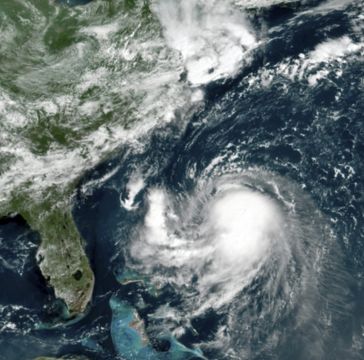Storm preparations grew more urgent on Saturday as the newly upgraded Hurricane Henri closed in on the north-eastern United States.
Landfall is expected Sunday and forecasters predict a dangerous storm surge could occur as early as late Saturday in portions of Long Island, Connecticut, Rhode Island and south-eastern Massachusetts.
The storm surge and tide could cause high water in coastal New England as Henri moves inland, while heavy rain and wind may also produce flooding.
Henri was veering a bit further west than originally expected, and if that track holds, it would have eastern Long Island in its bull’s-eye rather than New England, which has not taken a direct hit from a hurricane since Hurricane Bob in 1991, a Category 2 storm that killed at least 17 people.
Hurricane #Henri could be the first hurricane to directly hit Long Island since the 1980s.
New Yorkers: Take this seriously.
Prepare TODAY for the storm's expected landfall on Sunday.
Monitor your local forecast & stay safe.Advertisement— Archive: Governor Andrew Cuomo (@NYGovCuomo) August 21, 2021
New York has not had a direct hit from a powerful cyclone since Superstorm Sandy wreaked havoc in 2012.
New York governor Andrew Cuomo issued a state of emergency for parts of the state, imploring those in New York to take warnings seriously. He told people to stock up and move to higher ground.
Mr Cuomo also warned that heavy rains were expected to create problems far up into the Hudson River Valley.
The governor, who will leave office in two days following a sexual harassment scandal, urged people not to make bad choices and put themselves in places where they needed to be rescued.
#Henri has strengthened to a hurricane and is headed for Long Island and southern New England. Hurricane and Tropical Storm Warnings have been extended eastward. Here are the 11 am EDT Key Messages. See https://t.co/tW4KeFW0gB for details. pic.twitter.com/lRb61AnHaj
— National Hurricane Center (@NHC_Atlantic) August 21, 2021
Regardless of its exact landfall, broad impacts were expected across a large part of the northeast, extending inland to Hartford, Connecticut, and Albany, New York, and eastward to Cape Cod, which is teeming with tens of thousands of summer tourists.
Reflecting Henri’s changing track, a hurricane watch was lifted for the Cape on Saturday, though it remained under tropical storm and storm surge warnings.
The National Hurricane Centre said Saturday that a hurricane warning for the southern coast of New England, including Rhode Island, was being extended eastward to west of Westport, Massachusetts.
Massachusetts governor Charlie Baker urged people holidaying on the Cape to leave well before Henri hits, and those who planned to start holidays there to delay their plans.
“We don’t want people to be stuck in traffic on the Cape Cod bridges when the storm is in full force on Sunday,” he said.
🧵 To prepare for Tropical Storm #Henri and a potential power outage, here are some practical steps you can take to keep you and your family safe.
🔋 Make sure cellphones, laptops, and other electronics are fully charged.
⚡️ Power Outage Safety Tips: https://t.co/8tcifgrU1a pic.twitter.com/rcaYbqjkOL— MAEnergy Environment (@MassEEA) August 21, 2021
With a top wind speed of 75 mph Saturday morning, Henri speeded up slightly to move north-northeast at 14 mph. It is still about 465 miles south of Montauk on New York’s Long Island.
Governor Ned Lamont warned Connecticut residents they should prepare to “shelter in place” from Sunday afternoon to at least Monday morning as the state braces for the first possible direct hit from a hurricane in decades.
“This storm is extremely worrisome,” said Michael Finkelstein, police chief and emergency management director in East Lyme, Connecticut.
“We haven’t been down this road in quite a while and there’s no doubt that we and the rest of New England would have some real difficulties with a direct hit from a hurricane.”
The weather service warned of the potential for damaging winds and widespread coastal flooding from Henri, and officials in Massachusetts, Connecticut and New York cautioned that people could lose power for a week or even longer.







